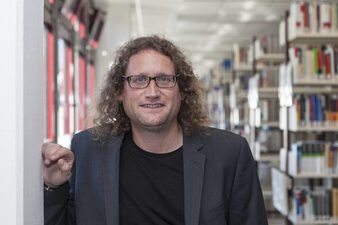The first 1000 copies of the Corona coloring book sold out faster than expected. The "Don Bosco" development aid association run by UAS social scientist Michael Boecker is now financing the reprint. The aim: to teach children in South African slums the rules of hygiene in the fight against coronavirus and other diseases through play.
"It is the first book about COVID-19 for children in the native language isiZulu and the public interest is great," reports Dr. Maud Mthembu from the University of Kwa Zulu-Natal. More than 17 national newspapers from Johannesburg to Cape Town have reported on Fachhochschule Dortmund's cooperation project with the University of Kwa Zulu-Natal and local non-governmental organizations (NGOs). "We didn't expect the huge demand," reports Prof. Dr. Michael Boecker, social scientist at Fachhochschule Dortmund. Together with his development aid association "Don Bosco", he is providing 2,500 euros for the next edition. The University of Kwa Zulu-Natal is also contributing to the funding.
Stories close to the reality of life
The idea for the picture and coloring book for six to twelve-year-olds was born in the consulting practice, as the pandemic has made it increasingly difficult to reach children in the suburbs, reports Michael Boecker on the experiences of the cooperation partners. The UAS professor has been researching issues in the context of the consequences of globalization together with South African universities since 2019. The coloring book project was conceived at Fachhochschule Dortmund. Children are more often asymptomatic than adults after an infection, but still contribute to the spread of the virus.
The aim is to teach them appropriate hygiene measures in a playful way. "The coloring book is based on the reality of life for those affected," says Michael Boecker. For example, washing hands in underdeveloped areas does not mean turning on the tap in the bathroom, but requires walking long distances to the nearest well and standing in line without any distance. The book also addresses coping strategies for quarantine and mourning. "The real experiences of children during the pandemic and the suffering caused by the pandemic form the basis for the stories in the book," adds Maud Mthembu.
Corona just one problem among many
The project participants are well aware that the demand for "social distancing" in South African villages and poor neighborhoods is reaching the limits of reality. "And also that corona is not the biggest problem for many people in Africa, but just one alongside HIV, tuberculosis and poor hygiene conditions, for example," says Boecker. Nevertheless, the aim is to raise awareness of the problem and draw attention to key issues that are important beyond corona.
The fact that the coloring book also comes with a few matching pencils is particularly popular with the children. Now that word of the book has spread, the second edition is sure to sell out just as quickly. The coloring books are distributed free of charge.
Prof. Michael Boecker, Dr.
Appointments can be arranged at short notice by e-mail

